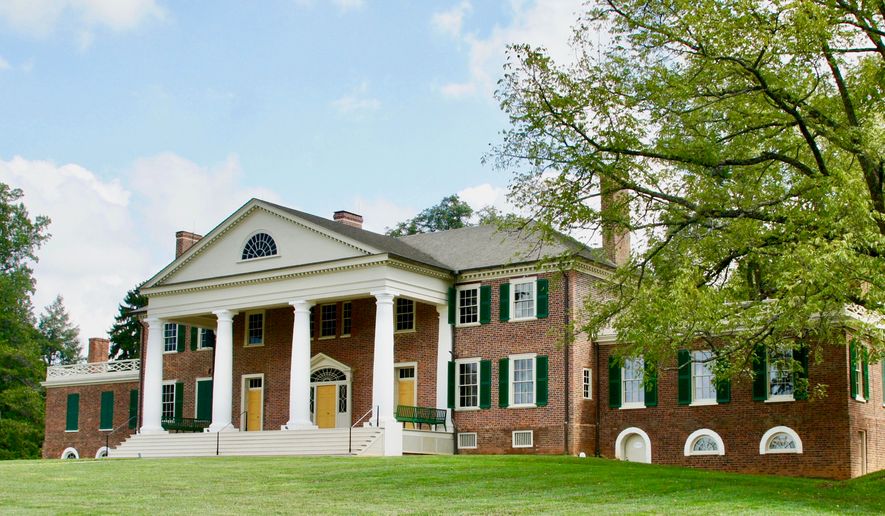Tourists wondering where the history ends and the ideological bias begins at some of America’s most venerable destinations now have a handy resource to consult, thanks to The Heritage Foundation.
The conservative think tank unveiled Monday its Heritage Guide to Historic Sites, an online handbook that grades the nation’s museums, battlefields, presidential homes and other venues on their historical accuracy while exposing woke narratives.
The first installment evaluates 35 sites in the 13 original colonies, but the foundation plans to expand the guide to include locations in all 50 states and the District of Columbia in time for the nation’s 250th birthday in 2026.
The guide evaluates each site for factors including “accuracy and comprehension,” “ideological bias,” “consideration for families” and “historical significance.”
Most of the 35 historic sites were given an A grade, meaning that they “uphold scholarly standards of proportionality, accuracy, and comprehensiveness, or a B, meaning that they may occasionally deviate from the highest standards, but not “egregiously” so.
“The next 250 years of our Republic depend on whether we can rekindle a true understanding of what it means to be an American — the rights and responsibilities of American citizenship,” said Heritage Foundation President Kevin Roberts in a statement.
“That’s why the new Heritage Guide to Historic Sites is so essential,” he said. “It equips American families with the tools they need to enjoy the sites that mark some of the greatest episodes in our nation’s history, without the Left’s anti-American and ahistoric narratives.”
Those receiving A grades include Mount Vernon, the Virginia home of Founding Father George Washington; Independence Hall and the National Constitution Center, both in Philadelphia, and the Martin Luther King Jr. National Historic House in Atlanta.
The lowest grade of C was reserved for sites that “demonstrate a pervasive neglect of comprehensiveness, accuracy, and proportionality, or even actively distort the subject matter of the site itself or the American story.”
Only three destinations received C grades. The most scathing review was reserved for Montpelier, the historic Virginia home of former President James Madison, which has in recent years shifted its focus to slavery and racial justice as opposed to the man hailed as the Father of the Constitution.
“Montpelier earns a ’C’ due to its notable lack of focus on James Madison, the inaccuracy of some of the exhibits, and its ideological telling of history,” said the guide. “There are no exhibits dedicated to James Madison and his contributions, the exhibit on the Constitution contentiously portrays the document as pro-slavery, and Montpelier engages in cherry-picking and historical distortions.”
Celebrate America’s 250th birthday with our NEW Heritage Guide to Historic Sites!
— Heritage Foundation (@Heritage) October 27, 2025
The guide currently evaluates more than 35 sites in the 13 original colony states, with plans to expand to historic sites in all 50 states plus D.C. in 2026. https://t.co/6h0ruQMgLH
The review will come as no surprise to followers of the Montpelier Foundation saga.
After years of battling, the foundation’s board voted in 2022 to share power with the Montpelier Descendants Committee, a nonprofit dedicated to “restoring the narratives of enslaved Americans at plantation sites in Central Virginia.”
The foundation is currently chaired by Hasan Kwame Jeffries, an associate history professor at Ohio State University and host of the Southern Poverty Law Center’s “Teaching Hard History” podcast.
“The site itself is beautiful and lends itself to families, as there are extensive grounds, gardens, and walking trails,” said the Heritage guide. “But as noted, much of the material at Montpelier seems more suited to prompting children to political activism than to educate them. All the books in the children’s exhibit are ones recommended by the Southern Poverty Law Center.”
The Montpelier appraisal was written by Brenda Hafera, assistant director of the Heritage Foundation’s Simon Center for American Studies, who has been critical of the SPLC’s influence at Montpelier and the effort to put “identity politics over the American Founding.”
The Washington Times has reached out to the Montpelier Foundation for comment.
The other two properties receiving “C” grades were the homes of two acclaimed female writers: poet Emily Dickinson and Harriet Beecher Stowe, author of “Uncle Tom’s Cabin.”
The Emily Dickinson Museum in Amherst, Massachusetts, was faulted for its “inadequate portrayal of Dickinson as a major poet of 19th-century” and its YouTube channel, which uses her poetry to promote “a whole host of progressive causes,” according to the guide.
The Harriet Beecher Stowe Center for Literary Activism in Hartford, Connecticut, was accused of offering an “indoctrination tour” that “elides or suppresses every element of complexity in the American past regarding the story of slavery” and “reduces literature to a handmaiden of crusading politics.”
Founded in 1968, the site was known as the Harriet Beecher Stowe Center until last year, when the name was changed to reflect its mission to “encourage social justice and literary activism.”
Ms. Hafera, the guide’s director, said she hopes the resource will “encourage Americans to visit historic sites to celebrate 250 years of shared heritage, sacrifice, and dedication to a remarkable set of eternal principles.”
“Traveling to battlefields, presidential homes and museums is a tradition we keep with family members, friends, and fellow citizens,” she said in a statement. “It is part of how we educate ourselves, as America’s historic sites form the landscape of public education. Now, families can go to the places where history really happened, equipped with additional resources that enrich the experience and provide confidence and accountability.”
• Valerie Richardson can be reached at vrichardson@washingtontimes.com.




Please read our comment policy before commenting.